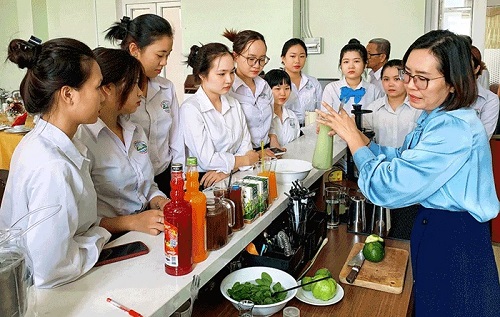
The tourism workforce in the Mekong Delta: surplus in quantity but lack of expertise
Based on statistics from the Institute for Tourism Development Research, Vietnam National Authority of Tourism, Vietnam currently employs over 1.3 million people in the tourism industry, with 42% having professional training. In the Mekong Delta, there are approximately 150,000 tourism workers, of which 51% are untrained. Only about 8% of them hold university and postgraduate degrees. Can Tho, Tien Giang, Kien Giang, and An Giang stand out as localities with a high proportion of trained human resources compared to the general level in the Mekong Delta region. These localities boast numerous hotels, restaurants, entertainment, recreation areas, and specialized tourism training schools, creating a more conducive learning and working environment.
Dr. Nguyen Anh Tuan, Director of the Institute for Tourism Development Research, pointed out several critical issues regarding tourism human resources in the Mekong Delta. He highlighted the significant shortage of skilled and qualified workers and the surplus of unqualified personnel. Additionally, he emphasized the limited proficiency in soft skills, foreign languages, and information technology among tourism professionals in the region. According to data from the Institute for Tourism Development Research, approximately 30-40% of tour guides and tour operators and 70-80% of restaurant receptionists do not meet foreign language standards. Moreover, many places still have limitations in applying technology to provide tourist services and utilities.
Master Dinh Hieu Nghia, Head of the Department of Travel Management - Tour Guide at Can Tho College of Tourism, has noted that the demand for tourism professionals in the Mekong Delta region has steadily increased. Many universities and colleges in the area offer tourism-related programs and are expanding their capacity each year. However, despite the growing number of graduates, there is a mismatch between the supply of tourism professionals and the demand from local businesses. This imbalance is attributed to a focus on quantity rather than quality, particularly in preparing graduates to meet the needs of the modern digital age.
Ms. Le Dinh Minh Thy, Director of Vietravel Can Tho, shares a similar perspective, emphasizing that the quality of tourism professionals in the Mekong Delta region does not meet the requirements for international integration. The industry faces challenges in recruiting skilled workers and often needs to provide additional training to align with the job market demands. Therefore, there is an urgent need to improve the quality of tourism education to meet industry standards.
The supply and demand of tourism human resources in the Mekong Delta region are unbalanced in quantity and quality, leading to both surplus and shortage. Experts, travel agencies, and tourism businesses have identified several reasons, including inadequate training quality, outdated programs in many training facilities, inappropriate teaching methods for the hospitality industry, and a lack of connection between training facilities and tourism businesses. Furthermore, the lack of policies to attract and retain talent, including low and disproportionate salaries, hinders the improvement of tourism human resources in the Mekong Delta region.
Finding solutions to improve the quality of human resources
To enhance the quality of tourism human resources in the Mekong Delta region in the future, Dr. Nguyen Anh Tuan, Director of the Institute for Tourism Development Research, suggested the following: "It is essential to formulate a tourism human resources strategy for the region, enhance the quality of training standards, strengthen the collaboration between training institutions and businesses, prioritize international training partnerships, and establish mechanisms and policies for training high-quality human resources."
MSc. Dinh Hieu Nghia of Can Tho College of Tourism also proposed specific measures from a management and training perspective. These include focusing on improving the quality of training, emphasizing practical skills, fostering collaboration between educational institutions and businesses, prioritizing the development of digital human resources, and implementing policies to support high-quality human resources.
According to Ms. Le Dinh Minh Thy, Director of Vietravel Can Tho, employers believe that for the tourism industry to develop its human resources effectively, there must be close coordination between various sectors. This includes a strong connection between the government, educational institutions, and employers. The government should take the lead in creating and implementing appropriate mechanisms and policies to facilitate the development of high-quality human resources. Academic institutions should design standardized curriculum frameworks that align with practical and market demands. At the same time, tourism employers should collaborate with training institutions, engage in teaching exchanges, and establish a dynamic internship environment.

Students during a bar kitchen practice session at Can Tho College of Tourism.
Many localities in the Mekong Delta have recognized the importance of developing high-quality human resources for tourism and finding solutions to drive change. Mr. Duong Tan Hien, Permanent Vice Chairman of Can Tho City People's Committee, stated, "Along with other localities in the Mekong Delta region, Can Tho City is prioritizing the development of tourism products and placing great emphasis on training and nurturing human resources through various programs, including long-term and short-term initiatives. Our goal is to meet practical requirements to enhance the quality of human resources in the tourism sector." Specifically, in line with Resolution No. 10-NQ/TU of the Can Tho City Party Committee for promoting tourism development in the new context, the Program on human resource development and awareness raising for the period 2021-2025 involves organizing 10-12 training courses and fostering tourism human resources with approximately 500-600 students per year by Can Tho Municipal Department of Culture, Sports and Tourism. As a result, over 70% of Can Tho's tourism workforce has received training. Additionally, Can Tho aims to attract around 10,000 workers in the tourism industry by 2025, with 75% of them having undergone training, professional development, and foreign language training. By 2030, the city aims to attract about 12,000 workers in the tourism industry, with 80% having received training, professional development, and foreign language training.
Similarly, Tra Vinh has been investing in human resources for tourism for many years. Mr. Nguyen Quynh Thien, Vice Chairman of Tra Vinh Provincial People's Committee, stated that from 2019-2023, the Department of Culture, Sports and Tourism of Tra Vinh Province collaborated with the Ho Chi Minh City Institute for Economic Development and Tourism Research to conduct 38 training courses for nearly 1,200 students on knowledge and skills in tourism. This has led to an innovation in the province's tourism human resources, gradually meeting the industry's requirements. Tra Vinh aims to have about 1,000 trained tourism human resources in the province by 2025 and about 1,900 people by 2030.
Mr. Pham Xuan Thuy, Deputy Director of the Vietnam National Authority of Tourism, mentioned that the current situation of tourism human resources in the Mekong Delta is also a common issue in many places. To bring about change and improve the quality of human resources, close coordination of the entire system is necessary, including focused and decisive direction from all levels of government, accurate and responsible advice from tourism management agencies, and active participation from the business community, associations, and social organizations. Additionally, workers in the industry must change their awareness, actively learn, and adapt to the dynamism of the market.
Source: Cantho News - Translated by Hoang Dat












